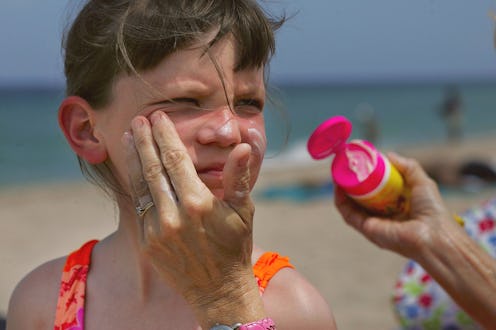Fashion
Youth in a World of Anti-Aging Products
Several few weeks ago, a personal essay about a woman embracing her gray hair hit the most-emailed mark on the New York Times website. Apparently gray hair on a 57-year-old woman is still shocking enough to garner massive attention. Aging (or the lack thereof) is a big-bucks, big-stakes business here in the USA, and beauty companies have invested a lot in making sure you don't get too comfortable with your gray head of hair. But I'm not here to talk conspiracy theories today. I'm here to talk about myself.
I'm 25. I have a wrinkle or two on my forehead, although my boyfriend swears he can't see them. I still break out every month on the reg. I live in a world infused with makeup ads and Lena Dunham's public existential crises and approximately ten billion beauty products so effectively marketed to my friends and me that we believe we don't just need them to look pretty, we need them to survive. Under-eye day cream. Under-eye night cream. De-puffing under-eye day cream. Decolletage cream. A $285 seaweed miracle worker that promises “virtually ageless” skin. (Ageless skin? What does that even look like?) Sometimes when I walk into Sephora, I feel like I'm having an anxiety attack. I thought I had a pretty good beauty routine but why don't I use an overnight resurfacing serum?!
No one comes right out and says it, but it's scary to be a young woman in a society that dreads aging. I find myself watching the backs of my hands, and wondering if 25 is my peak — or worse, was 18 my peak? Was 17 my peak? I find myself noticing the clock and thinking about the negative effects of the future much more than is healthy. I wash off my makeup at night not because it's good for my skin but because what about when I'm 50? I don't want to look old. Living in the moment be damned—we're too busy washing our faces with sweeping upward motions to counteract the effects of time.
As women, it is so easy for us to feel that our value is intrinsically tied up in our beauty, which means that as time passes, we feel as though we depreciate, like cars or computers. The idea that our worth is literally skin-deep is hard to shake. I want to transcend it, and I should be able to — I went to college and I'm a writer; gosh, I'm practically a revered member of the intelligentsia if you listen to my grandparents — but I can't. The thought of not being able to attract people is somewhat terrifying. I never make much money and I'm always sort of unsure about my talents, but as a young woman I do have a certain degree of power: Attraction is like a current, and you can snare people in it.
Of course the idea of getting older, of having a new body, is troubling at a certain level. It is quite literally the abandoning of the structure that keeps us tied to the earth. I live in a 25-year-old's body: That's who I am and what I know. But when I'm 35, I'll be grounded in that particular body, too. Still, saying “I'm afraid of my future body” feels like admitting a shameful secret.
Don't get me wrong; I don't want to be 25 my whole life. I don't expect to look 18 when I'm 45 (she said, obsessively slathering on argan oil anyway), because I realize that not only is that physically impossible, it's also really creepy. I'd like to look like a lovely, gracious, ridiculously wealthy 45-year-old woman with a shelf full Most Fabulous Person Oscars when I'm 45. Simple.
But the anti-aging industry doesn't encourage me to think this way. It tells me I should look 35 when I'm 45. (By extension, I should look 15 right now.) This industry preaches a utopian fantasy where all the cigarettes and suntans of your youth can be reversed by their “deep crease removal” serum and “age correcting” night cream. They have no interest in graceful aging — in eating vegetables and applying coconut oil and making a family and whatever else adults do. Instead, they fill their advertisements with young models applying cream and whisper why do you still have lines on your face? They are merciless. They reflect our own delusions. And it scares me.
I once experienced a revelation of sorts while closely examining a photo of a laughing Christina Hendricks. She looked absolutely stunning, of course. But the photo simply wouldn't have been the same without her laugh lines. They were such a part of her beauty that to Photoshop them out would have been to shatter the loveliness. And I just stared at her and thought, OK, OK, I can do this. There's something so beautiful, so quintessentially womanly about growing up.
